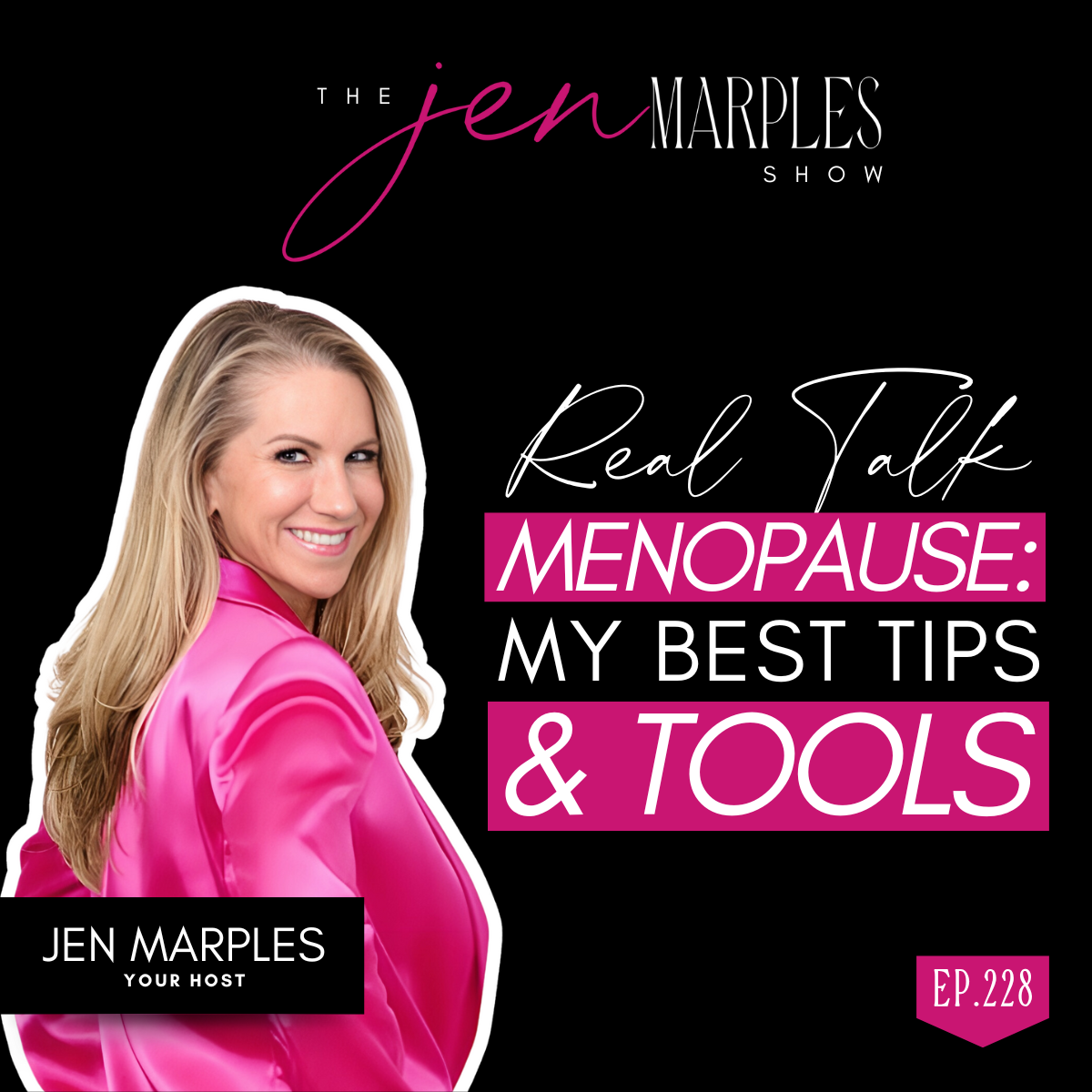
This Best Of replay features Gabriella Espinosa, a women’s empowerment and sexuality coach, and she’s about to shatter everything you think you know about pleasure after 40. Gabriella went from high-powered PR executive to burned-out mom who completely lost touch with her sexual self – until perimenopause hit and she realized that woman was still in there, just buried under years of putting everyone else first. Her journey back to herself led her to become a certified midlife empowerment and sexuality coach, and now she’s on a mission to help women reclaim what’s rightfully ours: our pleasure.
If you’ve ever felt like your libido packed up and left without a forwarding address, or if the thought of intimacy feels more like another item on your to-do list, this conversation will change everything. Gabriella breaks down the science of why women’s desire works differently than men’s (spoiler: we need those pleasure pathways awakened first), plus she gives practical steps you can start tonight. From the simple joy of wearing pink lipstick to more intimate self-exploration practices, she proves that pleasure truly has no expiration date – and reclaiming it might be the most radical act of self-care you can do.
Key Takeaways:
- The desire revelation: Why women need arousal BEFORE desire kicks in (and how this changes everything about intimacy)
- Pleasure pathway activation: Simple daily practices to reconnect with your body and expand your capacity for pleasure
- The menopause reality check: Practical solutions for dryness, pain, and the physical changes that can disconnect us from our sexuality
- Self-touch without shame: How exploring your own body becomes the foundation for better intimacy with yourself and your partner
- The ripple effect: Why prioritizing your pleasure isn’t selfish – it’s the energy source that feeds every other area of your life
Gabriella Says: You’re Not Too F***ing Old! to have great sex!
Rediscovering Your Sexual Self in Midlife: A Complete Guide
Introduction
You wake up one morning and realize something is missing. The woman who once felt confident, sexy, and alive seems to have vanished somewhere between school drop-offs, work deadlines, and endless to-do lists. If you’re a woman in midlife feeling disconnected from your body and sexuality, you’re not alone. This guide, inspired by insights from certified midlife empowerment and sexuality coach Gabriella Espinosa, will help you reclaim that missing piece of yourself.
This isn’t just about having better sex (though that’s a nice bonus). This is about reconnecting with your life force, your creative energy, and your power. When you tap into your pleasure and sexuality, you don’t just improve your intimate relationships—you transform how you show up in every area of your life. Your work becomes more inspired. Your relationships deepen. You feel more confident and alive.
This guide is for women who feel like they’ve lost themselves in the chaos of modern life, especially those navigating perimenopause and menopause. You deserve to feel vibrant, sensual, and fully alive at every stage of life.
Prerequisites
Before you dive in, ask yourself: Are you ready to challenge some deeply held beliefs about pleasure, sexuality, and what it means to be a “good woman”? This work requires you to unlearn years of conditioning that taught you to put everyone else’s needs before your own.
You’ll need to embrace the idea that prioritizing your pleasure isn’t selfish—it’s essential. The World Health Organization recognizes sexual health as fundamental to overall wellbeing. When you feel good in your body, you have more to give to others.
What You’ll Need:
- Privacy and time: Set aside moments when you won’t be interrupted
- A mirror: For getting to know your body
- Quality lubricant: Water-based is best for changing bodies
- Body oil or moisturizer: For daily self-care
- An open mind: Ready to explore what feels good for you
- Patience: This is a journey, not a quick fix
Step-by-Step Guide
Step 1: Understand Why Your Desire Changed (And Why That’s Normal)
Many women panic when their sex drive seems to disappear, thinking something is fundamentally wrong with them. The truth is much simpler and more hopeful than you might think. Your body hasn’t betrayed you—it’s actually working exactly as nature designed it to work. When you were younger and seeking a mate, your body relied on spontaneous desire. This is that instant spark, the physical attraction that could hit you out of nowhere. But once you’re in a committed relationship, especially after having children, your body shifts to what scientists call responsive desire. This means you need arousal before desire kicks in, not the other way around. Your male partner likely still operates on spontaneous desire, which is why he might seem ready to go at any moment while you need more time and attention to get in the mood. Understanding this difference removes the pressure and shame many women feel about their changing sexuality.
Key Takeaway: Your desire didn’t disappear—it just changed how it works. You’re not broken; you’re normal.
Action Steps:
- Accept that responsive desire is your body’s natural evolution
- Stop comparing your desire pattern to your partner’s
- Recognize that you need arousal to feel desire (not the other way around)
- Give yourself permission to need more time and foreplay
- Understand that this change often happens 6 months to 2 years into a relationship
Step 2: Start Small by Awakening Your Daily Pleasure Pathways
Most women try to jump straight into the bedroom when they want to reignite their sexuality, but this approach often fails because they’re trying to access advanced pleasure without building the foundation first. Think of pleasure like a muscle that needs regular exercise. If you’ve been disconnected from your body for years, you can’t expect to suddenly feel deeply sensual overnight. The secret is to start with tiny moments of mindful pleasure throughout your day. This could be savoring your morning coffee, wearing a color that makes you feel vibrant, or dancing to your favorite song. The key is bringing conscious awareness to how these simple pleasures make you feel in your body. When you practice noticing good sensations during everyday activities, you expand your capacity to feel pleasure in all areas of life. These small moments create neural pathways that make it easier to access deeper, more intimate pleasure later.
Key Takeaway: Small daily pleasures build your capacity for bigger pleasure. Start where you are, not where you think you should be.
Action Steps:
- Identify 3-5 simple things that make you feel alive and vibrant
- Practice mindful attention when doing these activities
- Notice physical sensations, not just mental enjoyment
- Return to these pleasant memories when you feel stressed or disconnected
- Build these micro-pleasures into your daily routine
Step 3: Reconnect With Your Body Through Self-Touch
Society teaches women that touching themselves is shameful or wrong, leading many to become strangers in their own bodies. This disconnection from physical sensation is one of the biggest barriers to sexual pleasure and overall vitality. Your entire body is capable of experiencing pleasure—not just the obvious zones. By exploring your body with curiosity and kindness, you discover what actually feels good to you, rather than what you think should feel good. Start with non-genital areas like your neck, inner arms, or feet. Use the tips of your fingers to explore with light, soft touches. Pay attention to areas that create pleasant sensations or make you want more touch. This isn’t about performing or achieving anything specific—it’s about gathering information about your unique pleasure map. When you know what feels good to you, you can communicate this knowledge to a partner, creating more satisfying intimate experiences for both of you.
Key Takeaway: Your body holds wisdom about pleasure, but you have to listen to access it. Self-touch is research, not performance.
Action Steps:
- Set aside 10-15 minutes of private time for exploration
- Start with non-genital areas that feel safe to touch
- Use light, curious touches rather than goal-oriented movements
- Notice what feels pleasant without judging or analyzing
- Practice this regularly to build comfort and knowledge
- Share discoveries with your partner when you feel ready
Step 4: Address the Physical Changes of Menopause Head-On
Many women suffer in silence as hormonal changes make sex uncomfortable or painful, leading them to avoid intimacy altogether. The decline in estrogen affects the vulva and vagina, causing thinning, dryness, and reduced elasticity—a condition called genitourinary syndrome of menopause. But here’s what most women don’t know: these changes are treatable and manageable with the right approach. The first step is getting familiar with your intimate anatomy. Many women have never actually looked at their own vulva, making it impossible to notice changes or communicate needs effectively. Use a mirror to explore and understand what’s normal for your body. Daily moisturizing helps maintain tissue health, while quality lubricants make intimate touch comfortable again. Don’t suffer through painful sex thinking it’s just part of aging—talk to your healthcare provider about treatments like topical vaginal estrogen, which can help restore tissue health.
Key Takeaway: Menopause changes your body, but it doesn’t have to end your sex life. Knowledge and proper care can restore comfort and pleasure.
Action Steps:
- Get familiar with your vulva using a mirror
- Moisturize intimate areas daily, just like you would your face
- Invest in high-quality, water-based lubricant
- Don’t ignore pain during sex—address it with your doctor
- Ask about vaginal estrogen therapy if you’re experiencing significant changes
- Remember that these changes are treatable, not permanent
Step 5: Build a Compassionate Relationship With Your Changing Body
The biggest barrier to midlife sexuality isn’t physical—it’s mental. Years of negative self-talk, body shame, and unrealistic beauty standards create a wall between you and pleasure. When you constantly criticize your body or focus only on what’s wrong, you shut down your ability to feel good sensations. Your nervous system can’t relax into pleasure when it’s busy defending against attack, even when that attack comes from your own thoughts. The solution is to consciously shift your focus from what’s wrong to what feels good right now. This doesn’t mean ignoring real discomfort, but rather balancing awareness of challenges with appreciation for what’s working well. When you practice gratitude for your body and actively notice pleasant sensations throughout the day, you create the internal conditions necessary for pleasure to flourish. Your body is inherently wired for goodness and pleasure—you just have to allow yourself to feel it.
Key Takeaway: How you think about your body directly affects your ability to feel pleasure. Compassion and gratitude unlock sensations that criticism blocks.
Action Steps: • Practice daily body appreciation, acknowledging what your body does well • When you notice criticism, gently redirect attention to something that feels good • Use positive affirmations about your body’s capacity for pleasure • Focus on function and feeling rather than appearance • Remember that your body is meant to change—this is normal and natural • Treat your body like you would a good friend: with kindness and respect
Conclusion
Your sexuality and pleasure aren’t luxuries to be enjoyed only when everything else is perfect—they’re fundamental aspects of your vitality that deserve attention and care. The woman you were before motherhood, career demands, and life’s responsibilities didn’t disappear; she’s simply been waiting patiently for you to remember her.
The journey back to your sexual self isn’t about returning to who you once were, but rather about discovering who you’re becoming. Your body has wisdom. Your pleasure matters. Your desire—whether it shows up as spontaneous spark or needs gentle coaxing—is valid and valuable.
Your Action Plan:
- Accept your body’s natural evolution from spontaneous to responsive desire
- Start small with daily micro-pleasures that make you feel alive
- Explore your body with curious, non-judgmental touch
- Address physical changes proactively with proper care and medical support
- Cultivate compassion for your changing body and its amazing capacity
Remember: pleasure has no expiration date. You’re not too old, too busy, or too far gone to reclaim this vital part of yourself. Every small step you take toward reconnecting with your body and pleasure creates ripple effects that transform not just your intimate life, but every area of your existence.
Start today. Start small. Start with kindness. Your future self will thank you for taking this brave first step back to wholeness.
Learn more about Jen Marples at https://www.jenmarples.com
Want to work with Jen? Book a complimentary 20-minute call HERE.
Follow Jen @jenmarples on Instagram, LinkedIn, TikTok and YouTube
Subscribe to Jen’s Newsletter
Unedited AI Transcript Here
CONNECT WITH GABRIELLA ESPINOSA:




